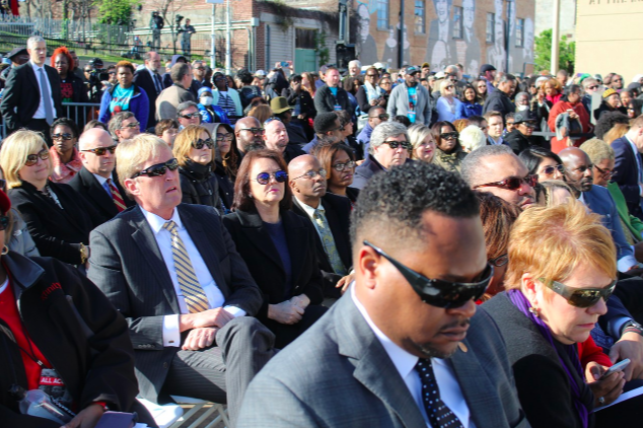There was a chill in the air, but the sky was clear and the sun was bright as tens of thousands of people from all over the world converged on downtown Memphis for a full day of events commemorating the 50th anniversary of the assassination of Dr. Martin Luther King, Jr.
Beginning mid-morning, thousands rallied at Beale and Danny Thomas in front of AFSCME Local 1733 headquarters, where a festival-sized stage had been erected. Speakers, including Senator Bernie Sanders, whipped up the crowd for economic justice, with topics ranging from the need for universal health care to the Fight For $15 movement to increase the minimum wage. Performers included 1980s superstar Sheila E.  Maya Smith
Maya Smith
Backstage, politicians, and union members mingled. Survivors from the 1968 Sanitation Workers Strike were treated as superstars, with Rev. James Lawson attracting throngs of admirers. Democratic gubernatorial candidate Karl Dean shook hands, praised Dr. Martin Luther King’s legacy of struggle, and affirmed his support for Medicaid expansion in Tennessee.
When it came time for the crowd to become marchers, the schedule slipped, as logistical challenges—as well as the challenge of corralling several thousand fired-up leftists—mounted. There were further delays when media photographers and videographers scrummed as Yolanda Renee King, Dr. King’s granddaughter, took her place at the vanguard of the march. Eventually, organizers and the strong police presence cleared out the media obstructions and the chanting throngs proceeded down Danny Thomas in an more orderly fashion. Included were representatives from the Teamsters, the Airline Pilots Association, and the NAACP, among many other represented groups.
MLK50: A Day to Remember in Memphis
At the National Civil Rights Museum, speakers and music began early in the day as crowds swarmed in and out. From a podium in front of the Lorraine Motel’s fateful room 306, speakers emphasized that, at the end of his life, Dr. King was increasingly concerned with economic justice In contrast with the more hagiographic tone of the 40th anniversary ceremonies, these proceedings were explicitly political. “Agitate, organize vote. And we must stay woke!” was a typical comment from the podium, which was set up on the balcony where King was killed. Rev. Dr. William J. Barber, leader of the revived Poor People’s Campaign, delivered some of the proceedings most powerful words, quoting King with “Nothing would be more tragic than to turn back now…”
In a pointed reference to incidents in Memphis that occurred earlier in the week, Barber said “We lock people up who fight for $15 when we let corporate crooks go every day.”
Barber pointed out the grinding poverty in Memphis before expanding his scope to the entirety of Tennessee, where 1.4 million poor people “Mostly white, mostly women and children” still struggle, while the “governor and the legislature have refused to pass living wage, but they have passed voter suppression, and you have some politicians so arrogant that they will stand on this stage and say they honor Dr. King, while every day they dishonor him with policy.”
Later, the targets of Barber’s words took the stage to the day’s most raucous—and hilarious—reception. Mayor Jim Strickland was greeted with a growing chorus of jeers and chants, which continued as Shelby County Mayor Mark Luttrell spoke. When Congressman Steve Cohen took the stage, the crowd fell respectfully silent and applauded his calls for universal health care. Then it was Governor Bill Haslam’s turn. His good natured, conciliatory boilerplate was greeted with boos and laughter. As he left the stage, the term limited governor was sent off with chants of “Hey hey hey, goodbye.”
[slideshow-1]
When Rev. Lawson took the podium to eulogize his friend and call to renew Dr. King’s mission in the 21st century, his words echoed across the rapt plaza. Lawson recalled meeting King for the first time on December 8, 1955, and that same day Rosa Parks had said to him “God has given us our Moses.”
Lawson blamed much of our country’s current ills on what he called a culture of violence. “The nonviolent struggle is true to beginning theology and philosophy of American that all men are created equal, and endowed by their creator with the inalienable right to life liberty and pursuit of happiness. That is the language of the nonviolent movement…If we continue our worship of the god of Mars, of violence, we will not only destroy ourselves, we will transform our planet into a cold hunk of starstuff.”
Speakers continued right up until 6:01 PM, when the bell from Clayborn Temple rang out at the moment of Dr. King’s assassination. After a moment of silence punctuated by sobs from the crowd, the opening chords of “Precious Lord” rang out across the plaza. Al Green’s soulful rendition of Dr. King’s favorite spiritual was as powerful and profound a musical moment as this reporter has ever witnessed. Then, as he was joined on the stage by Rev. Jesse Jackson, Green said “They told me to do just one song, but I think we’ve got time for another” and whipped his band into “Love and Happiness” as Jackson grinned and sang along. The final moments of beauty and chaos capped the profoundly moving day in the most Memphis way possible.
Our political columnist Jackson Baker was on the way to cover the day’s events when he fell ill and asked me to fill in for him. I hope I have treated his space with the respect it deserves and wish him a speedy recovery.